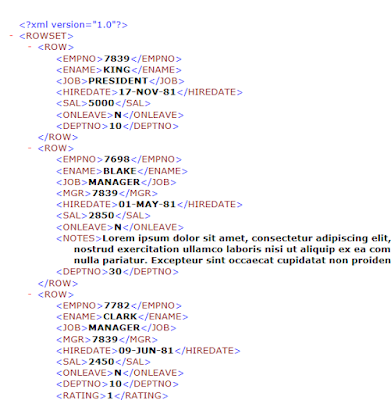Step 1: Create plsql function clob_to_blob. It should return the BLOB.
create or replace
FUNCTION clob_to_blob(
p_clob_in IN CLOB)
RETURN BLOB
IS
v_blob BLOB;
v_offset INTEGER;
v_buffer_varchar VARCHAR2(32000);
v_buffer_raw RAW(32000);
v_buffer_size binary_integer := 32000;
BEGIN
IF p_clob_in IS NULL THEN
RETURN NULL;
END IF;
dbms_lob.createtemporary(v_blob, TRUE);
v_offset := 1;
FOR i IN 1 .. ceil(dbms_lob.getlength(p_clob_in) / v_buffer_size)
loop
dbms_lob.READ(p_clob_in, v_buffer_size, v_offset, v_buffer_varchar);
v_buffer_raw := utl_raw.cast_to_raw(v_buffer_varchar);
dbms_lob.writeappend(v_blob, utl_raw.LENGTH(v_buffer_raw), v_buffer_raw);
v_offset := v_offset + v_buffer_size;
END loop;
RETURN v_blob;
END clob_to_blob;
Step 2: Call the function and test it.
DECLARE
l_xml CLOB;
l_blob BLOB;
l_clob_to_blob BLOB;
l_file_name VARCHAR2(200);
l_id NUMBER;
BEGIN
-- Generate XML
SELECT dbms_xmlgen.getxml('select * from emp') xml
INTO l_xml
FROM dual;
-- Print CLOB
print_clob_to_output (l_xml);
-- Convert CLOB to BLOB
l_clob_to_blob := clob_to_blob (l_xml);
-- Set File Name
l_file_name := 'Employee Management Report (' ||to_char(SYSDATE,'DDMMYYYYHHMISS') ||')' ||'.xml';
-- Send mail - Converted BLOB as attachment
l_id := apex_mail.send( p_to => 'orclking@yyy.com',
p_from => 'xxx@yyyy.com',
p_subj => 'Employee Management Report',
p_body => 'Please review the attachment.',
p_body_html => 'Please review the attachment'
);
apex_mail.add_attachment ( p_mail_id => l_id,
p_attachment => l_clob_to_blob,
p_filename => l_file_name,
p_mime_type => 'xml'
);
END;
Related Posts:
create or replace
FUNCTION clob_to_blob(
p_clob_in IN CLOB)
RETURN BLOB
IS
v_blob BLOB;
v_offset INTEGER;
v_buffer_varchar VARCHAR2(32000);
v_buffer_raw RAW(32000);
v_buffer_size binary_integer := 32000;
BEGIN
IF p_clob_in IS NULL THEN
RETURN NULL;
END IF;
dbms_lob.createtemporary(v_blob, TRUE);
v_offset := 1;
FOR i IN 1 .. ceil(dbms_lob.getlength(p_clob_in) / v_buffer_size)
loop
dbms_lob.READ(p_clob_in, v_buffer_size, v_offset, v_buffer_varchar);
v_buffer_raw := utl_raw.cast_to_raw(v_buffer_varchar);
dbms_lob.writeappend(v_blob, utl_raw.LENGTH(v_buffer_raw), v_buffer_raw);
v_offset := v_offset + v_buffer_size;
END loop;
RETURN v_blob;
END clob_to_blob;
Step 2: Call the function and test it.
DECLARE
l_xml CLOB;
l_blob BLOB;
l_clob_to_blob BLOB;
l_file_name VARCHAR2(200);
l_id NUMBER;
BEGIN
-- Generate XML
SELECT dbms_xmlgen.getxml('select * from emp') xml
INTO l_xml
FROM dual;
-- Print CLOB
print_clob_to_output (l_xml);
-- Convert CLOB to BLOB
l_clob_to_blob := clob_to_blob (l_xml);
-- Set File Name
l_file_name := 'Employee Management Report (' ||to_char(SYSDATE,'DDMMYYYYHHMISS') ||')' ||'.xml';
-- Send mail - Converted BLOB as attachment
l_id := apex_mail.send( p_to => 'orclking@yyy.com',
p_from => 'xxx@yyyy.com',
p_subj => 'Employee Management Report',
p_body => 'Please review the attachment.',
p_body_html => 'Please review the attachment'
);
apex_mail.add_attachment ( p_mail_id => l_id,
p_attachment => l_clob_to_blob,
p_filename => l_file_name,
p_mime_type => 'xml'
);
END;


Wow super bro.
ReplyDeleteThanks
DeleteMinprobVprop-ko April Torres download
ReplyDeletevesikigo
YterpposOtichi Kristy Brooks MOBILedit Forensic Express Pro 7.4.1.21502
ReplyDeleteCorel Painter
Check it
Tenorshare 4MeKey 4.0.6.7
lentlocalons